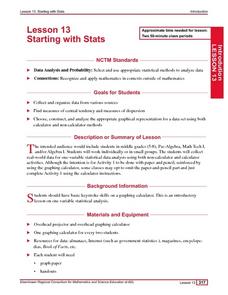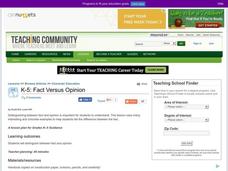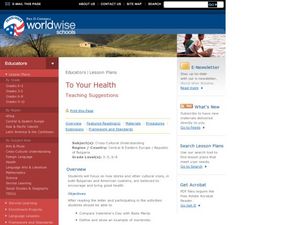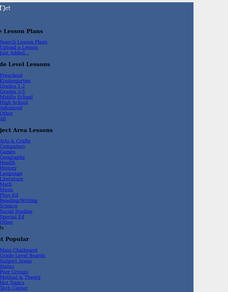Curated OER
The Green Truck Garden Giveaway
Students read "The Green Truck Garden Giveaway" and explore the hobby of gardening. After observing illustrations in the book, students predict possible events in the story. They discuss gardening and write a story about a community...
Curated OER
Starting With Stats
Statisticians analyze a data set of student IQs by finding measures of central tendency and dispersion such as mean, median, mode, and quartiles. They practice using a graphing calculator to find the values and analyze box plots and...
Concord Consortium
Leap Years and Calendars
How many birthdays do leap year babies have in a lifetime? Learners explore the question among others in a lesson focused on different calendar systems. Given explanations of the Julian, Gregorian, and Martian calendars, individuals use...
Prairie Public Broadcasting
Egyptian Pyramids Virtual Field Trip!
A virtual field trip takes enthusiastic travelers to the pyramids of Giza. Using Google, scholars explore the grounds of the ancient pyramids found in Egypt then complete three worksheets: a photo analysis page, a reflection sheet, and a...
Curated OER
Sand, Sand, Everywhere Sand
Learners study the physical characteristics of four types of desert regions. In this desert regions lesson, students watch a video about deserts and discuss the deserts. Learners compare the deserts and research the ways humans have...
Curated OER
What Are We Going To Do About Baby Six Billion?
Students formulate and evaluate suggestions about government policy using demographic examples and projections. They examine websites and utilize worksheets imbedded in this plan.
Curated OER
Living in an "Olympic" Country
Young scholars research countries participating in the Olympic Games. They create a database which includes graphs for comparing population density, the number of athletes, per capita income, etc. for each country. This project is...
Scholastic
Perfect Postcards: Illinois
Connect the geography and history of Illinois using an art-centered lesson on the railroads. The railroad connected once-distant places, particularly in the Midwest. Using research, class members create postcards of fictional cross-state...
Curated OER
Fact Versus Opinion
Students differentiate between fact and opinion. They define fact and opinion, then listen to and identify examples of each. Students identify different books where facts and opinions can be found, and cut out newspaper and magazine...
Curated OER
To Your Health
Young scholars read articles on health and read about how storks and other animals are cultural icons in bringing good health. In this health lesson plan, students also list ways to live a healthy lifestyle.
Curated OER
International Curiosity and National Pride
Pupils analyze their own culture and a Bulgarian culture to identify national, local, or ethnic traits. For this culture analysis lesson, students identify three important characteristics of their culture and compose a list of...
Curated OER
Iraq, Where's That?
Students identify the Middle Eastern countries on the map and the oil-producing countries of OPEC in the region. They examine whether the presence of important producing oil fields qualifies as a characteristic of this region.
Curated OER
Franklin Learning Activities
Students participate in different activities examining Benjamin Franklin and his activities. They work together in groups and as a class to research his inventions and his self-improvement plans.
Curated OER
Comparative Geography I
Students use population density and other statistics to compare countries. They find the population density for the countries listed in the table. Students compare findings with a partner, and then share with the class.
Curated OER
Cooperative Learning, Sci., Tech., Lang
Students research, write, edit, revise and present a paragraph, using word processor, about animal of their choice, including description, where animal lives, what it eats, its habits, e.g. is it endangered, migration, hibernation,...
Curated OER
PERCEIVINGT A CULTURE THROUGH ITS LITERATURE
Studentsexamine cultural values in literature, identify the cultural assumptions, prejudices, and purposes of authors and translators, use historical perspective to determine if the values and lifestyle depicted apply to contemporary...
Curated OER
Ancient Egypt
Students use the internet to gather information on Ancient Egypt. Using this information, they create their own name cartouche using markers and construction paper. They also make pyramid cutouts and draw pictures of the Great Sphinx.
Curated OER
Weathering the Odds
Students explore the limitations of weather forecasting and how consumer-driven weather forecasting companies attempt to meet the demand for accurate, long-term weather forecasting. They act as meteorologists, researching the weather.
Curated OER
SAVE OUR EARTH
Students research current environmental problems in order to develop and deliver an oral presentation. The presentation persuades the audience to act on the student's point of view on the issue.
Curated OER
Science on the Skids
Students discuss the decline in the sciences in America by comparing statistics and information from the U.s. to other countries. Then they write and deliver a "State of the Sciences" address to their peers.
Curated OER
To Your Health
Young scholars focus on how storks and other cultural icons, in both Bulgarian and American customs, are believed to encourage and bring good health. They list three natural phenomena in their region prominently associated with the...
Curated OER
Graph the Presidents At Inauguration- How Old Were They?
Students construct a graph of the presidents' ages at inauguration. In this U.S. history lesson plan, students use online resources to gather data about the presidents and accurately present their results on a graph.
Curated OER
A System of Rules
Young scholars write letters, create models, create a photo display, and make charts about the rules that a state has. In this rules lesson plan, students learn about and make different displays of how states come up with rules, change...
Curated OER
International Curiosity and National Pride
Students investigate the national, local, and ethnic traits of the Bulgarian culture. They discuss patriotic American songs, analyze a map, play a '20 Questions' game about Bulgaria, read a letter, and identify American culture...

